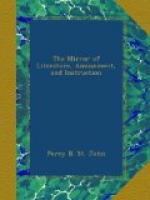Sir Humphry Davy was born December 17, 1779, at Penzance, in Cornwall. His family was ancient, and above the middle class; his paternal great grandfather had considerable landed property in the parish of Budgwin, and his father possessed a small paternal estate opposite St. Michael’s Mount, called Farfal, on which he died in 1795, after having injured his fortune by expending considerable sums in attempting agricultural improvements. Sir Humphry received the first rudiments of his education at the grammar-schools of Penzance and Truro: at the former place, he resided with Mr. John Tomkin, surgeon, a benevolent and intelligent man, who had been intimately connected with his maternal grandfather, and treated him with a degree of kindness little less than paternal. His genius was originally inclined to poetry; and there are many natives of Penzance who remember his poems and verses, written at the early age of nine years. He cultivated this bias till his fifteenth year, when he became the pupil of Mr. (since Dr.) Borlase, of Penzance, an ingenious surgeon, intending to prepare himself for graduating as a physician at Edinburgh. As a proof of his uncommon mind, at this early age, it is worthy of mention, that Mr. Davy laid down for himself a plan of education, which embraced the circle of the sciences. By his eighteenth year he had acquired the rudiments of botany, anatomy, and physiology, the simpler mathematics, metaphysics, natural philosophy, and chemistry. But chemistry soon arrested his whole attention. Having made some experiments on the air disengaged by sea-weeds from the water of the ocean, which convinced him that these vegetables performed the same part in purifying the air dissolved in water which land-vegetables act in the atmosphere; he communicated them to Dr. Beddoes, who had at that time circulated proposals for publishing a journal of philosophical contributions from the West of England. This produced a correspondence between Dr. Beddoes and Mr. Davy, in which the Doctor proposed, that Mr. Davy, who was at this time only nineteen years of age, should suspend his plan of going to Edinburgh, and take a part in experiments which were then about to be instituted at Bristol, for investigating the medical powers of factitious airs; to this proposal Mr. Davy consented, on condition that he should have the uncontrolled superintendence of the expements. About this time he became acquainted with Davies Gilbert, Esq. M.P. a gentleman of high scientific attainments, (now President of the Royal Society), with whom he formed a friendship which has always continued; and to Mr. Gilbert’s judicious advice may be attributed Mr. Davy’s adoption of and perseverance in the study of chemistry. With Dr. Beddoes, Mr. Davy resided for a considerable time, and was constantly occupied in new chemical investigations. Here, he discovered the respirability of nitrous oxide, and made a number of laborious experiments on gaseous bodies, which he afterwards published in “Researches




